
# 213
February 20, 2004
In this issue:
UNITED NATIONS IN KYRGYZSTAN
- UN Journalist Club meeting
UNITED NATIONS DEVELOPMENT PROGRAMME (UNDP)
- SIDA/UNDP/Kyrgyz Government project “Gender in Politics in the Kyrgyz Republic” launched in Bishkek
- UNDP/GEF projects “National Self-Assessment of Capacity to Implement Global Environmental Conventions“ conducts its starting seminar
- Briefing for journalists on UNDP AIDS Report Launch took place at the UN House on 20 February
UNITED NATIONS CHILDREN’S FUND (UNICEF)
- An issue of competence on HIV/AIDS among the UN staff in Kyrgyzstan was on agenda of the meeting of Heads of UN Agencies in Kyrgyzstan
UNITED NATIONS IN KYRGYZSTAN
The meeting of the UN Journalist Club took place on 16 February in Bishkek.
The focus theme for the meeting was gender equality and the UN agencies' activities to empower women in Kyrgyzstan. UNICEF was hosting the meeting this time.
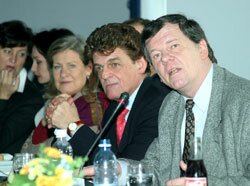 Mr. Jerzy Skuratowicz, UN Resident Coordinator in his welcoming address said that the UN Family in Kyrgyzstan puts lots of strengths to support efforts of national institutions in achieving fair gender balance in the country. The UN Thematic Group on Gender was established aimed at coordination of activities; a lot of activities undertaken by all UN Agencies aimed at providing assistance to the country in achieving the third goal in MDGs. That is why, especially on the eve of the International Women’s Day it was important to initiate a debate in Kyrgyz society on this issue since the role of journalists in this discussion couldn’t be over estimated. Mr. Jerzy Skuratowicz, UN Resident Coordinator in his welcoming address said that the UN Family in Kyrgyzstan puts lots of strengths to support efforts of national institutions in achieving fair gender balance in the country. The UN Thematic Group on Gender was established aimed at coordination of activities; a lot of activities undertaken by all UN Agencies aimed at providing assistance to the country in achieving the third goal in MDGs. That is why, especially on the eve of the International Women’s Day it was important to initiate a debate in Kyrgyz society on this issue since the role of journalists in this discussion couldn’t be over estimated.
Invited guests for the Club meeting were Ms. Aigul Kangeldieva, Executive Secretary of the National Council on Women, Family and Gender Development under the President of the Kyrgyz Republic, Ms. Toktokan Borombaeva, Deputy of the Kyrgyz Parliament, Ms. Bonnie Bernstrom, Sprangbradan, Sweden, Mr. Goran Wimmerstrom, consultant of SIDA/UNDP/Kyrgyz Government project “Gender in Politics in the Kyrgyz Republic” and Ms. Altyn Djanyshbaeva, businesswoman from a rural area of Chui valley.
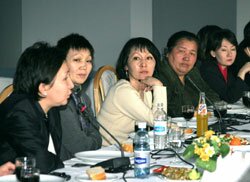 Ms. Kangeldieva and Ms. Borombaeva briefed members of the Club both on the official report made by the Kyrgyz Government and alternative report, prepared by non-governmental organizations represented to the meeting of the UN Committee on Elimination of Discrimination against Women (CEDAW) in New York recently. Ms. Kangeldieva and Ms. Borombaeva briefed members of the Club both on the official report made by the Kyrgyz Government and alternative report, prepared by non-governmental organizations represented to the meeting of the UN Committee on Elimination of Discrimination against Women (CEDAW) in New York recently.
“Much is being done to improve the status and rights of Kyrgyz women, - said Ms. Kangeldieva at the meeting. But much more is still ahead of us. We have to work together with our partners, civil society and media in order to achieve such situation in the country when men and women could equally participate in the decision making process.”
Ms. Borombaeva highlighted that with support of UNDP and other international agencies progress was achieved in changing of men – members of Kyrgyz Parliament gender stereotypes. In the result legislative foundation for gender equality have been firmly established.
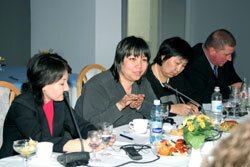 A lively and friendly discussion of the current situation in the area of gender ensued. It included discussion on gender stereotypes and eastern mentality of Kyrgyz society, its customs and traditions. Not only was the topic of gender in the focus of the Club members, but the journalists, invited guests of the Club and heads of UN Agencies discussed principles and roles of democracy and parliamentarism in the development of the society, education system in Kyrgyzstan and worsening situation in the country with girl’s access to primary education, especially in provinces, as well as rights of women for all kind of property including land. A lot of attention was paid to current situation with women in prisons, women’s traffic and problems in the area of official and illegal labor migration. A lively and friendly discussion of the current situation in the area of gender ensued. It included discussion on gender stereotypes and eastern mentality of Kyrgyz society, its customs and traditions. Not only was the topic of gender in the focus of the Club members, but the journalists, invited guests of the Club and heads of UN Agencies discussed principles and roles of democracy and parliamentarism in the development of the society, education system in Kyrgyzstan and worsening situation in the country with girl’s access to primary education, especially in provinces, as well as rights of women for all kind of property including land. A lot of attention was paid to current situation with women in prisons, women’s traffic and problems in the area of official and illegal labor migration.
Ms. Bonnie Bernstrom, from the Swedish NGO Sprangbradan who was in Bishkek with a mission to launch the SIDA, UNDP and Kyrgyz Government project “Gender in Politics in the Kyrgyz Republic” also actively participated in the discussion of the UN Journalist Club and answered a lot of questions by Kyrgyz journalists.
Note: The UN Journalist Club was officially launched in October 2003, on the eve of the UN Day celebration in Kyrgyzstan. The main goal of the Club was to build a firm platform for friendly, unofficial discussion of the most important areas of development, UN contribution and partnership on the way of MDGs achievement in Kyrgyzstan. Up to date there are more than fifty journalists represent actually all Kyrgyz media and national stringers of the international news agencies are enjoy their memberships in the Club.
For additional information please contact Olga Grebennikova, UNDP Public Relations Officer. Tel.: (0 996) 312 61-12-13. Fax: (0 996) 312 61-12-17. Email:
UNITED NATIONS DEVELOPMENT PROGRAMME (UNDP)
“Gender in Politics in the Kyrgyz Republic” project launched at the UN House in Bishkek on 13th February.
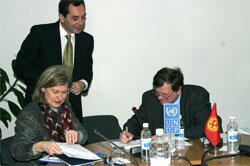 This joint project of the Swedish Agency for International Development (SIDA), UNDP and Kyrgyz Government is aimed at strengthening of women leaders' capacity, enabling them to more actively participate in political life of Kyrgyzstan on the eve of upcoming municipal elections in 2004 and parliamentarian elections in 2005. Thus the Central Election Committee of the Kyrgyz Republic is the main partner of UNDP and SIDA within the project on behalf of the Kyrgyz Government. This joint project of the Swedish Agency for International Development (SIDA), UNDP and Kyrgyz Government is aimed at strengthening of women leaders' capacity, enabling them to more actively participate in political life of Kyrgyzstan on the eve of upcoming municipal elections in 2004 and parliamentarian elections in 2005. Thus the Central Election Committee of the Kyrgyz Republic is the main partner of UNDP and SIDA within the project on behalf of the Kyrgyz Government.
Planned up to June 2005 the project envisages a set of intensive training in leadership, gender equality, political campaigning technique, creation of a political image, social partnership and other, very important for future politicians themes. Besides, other important components of the project will be training for journalists, involvement of political parties into gender debate and creation of information network.
It is expected that the project will significantly contribute to promotion of gender equality in the country.
Since 1995 UNDP has been active in promoting gender equality at all levels of Kyrgyz society, providing support in the area of policy development at the National level and working with women leaders on the grassroots level; building the capacity of non-governmental organizations in the area of gender and coordinating efforts of donors in this direction; involving of the National media into the debate on gender and encouraging gender sensitive statistics at the National level.
“Without equal participation of all segments of the society in decision making process the development of the country could not be successful", said Jerzy Skuratowicz, UNDP Resident Representative during the launch.
“We’ll work closely with all organizations, including NGOs, mass media, representatives of political parties and Kyrgyz Government within this project in order to achieve an equal participation as men so women in political processes in Kyrgyzstan", said Mr. Sulaiman Imanbaev, Chairman of the Central Elections Committee of the Kyrgyz Republic in his welcoming address.
For additional information please contact Olga Grebennikova, UNDP Public Relations Officer. Tel.: (0 996) 312 61-12-13. Fax: (0 996) 312 61-12-17. Email:
The UNDP/GEF and Kyrgyz Government project “National Self-Assessment of Capacity to Implement Global Environmental Conventions” started its activities by conducting a seminar for the national partners.
The seminar aimed to establish a solid background for partnership not only with governmental agencies but also with academia, non-governmental sector, research institutions and mass media.
In his welcoming speech Mr. Ularbek Mateev, Deputy Prime Minister of the Kyrgyz Republic said that Kyrgyzstan is being more and more actively involved into the initiatives of international society towards containment of ecological threats. “With starting of this important project, we are waiting for a significant progress of well-coordinated activities in the national capacity-building aimed at protection and rational usage of natural resources and implementing the Environmental Conventions Kyrgyzstan has signed”, he said.
“The project will support to establish a strong dialogue of governmental bodies with civil society, and other partners in Kyrgyzstan in order to enable the country to start practical implementation of the Global Environmental Conventions," - said Mr. Kanat Januzakov, Deputy Minister of Ecology and Emergencies of the Kyrgyz Republic at the seminar.
Around sixty participants represented key governmental agencies, including the Ministry of Health, Ministry of Agriculture and Water Resources, State Forestry Service, State Agency on Energy, Ministry of Finance, Ministry of Foreign Affairs, as well as Kyrgyz Parliament, non-governmental sector, academia, research institutions, and mass media who discussed the ways of effective project implementation in Kyrgyzstan.
“We’ll use widely potential of those advanced non-governmental organizations in Kyrgyzstan gained a significant experience in the area of environment protection and expertise," said Ms. Mira Jangaracheva, the project manager during her presentation at the seminar.
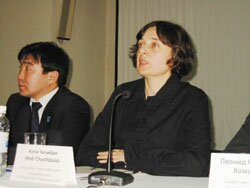 “The most important operational principle of this project is its national ownership", said Ms. Keti Chachibaia, Assistant Regional Coordinator on UNDP/GEF cooperation from the UNDP's Regional Bureau for Europe and CIS. "Therefore it is crucial to consider priorities of the country in this project; it will definitely guarantee success and effectiveness of its activity”. “The most important operational principle of this project is its national ownership", said Ms. Keti Chachibaia, Assistant Regional Coordinator on UNDP/GEF cooperation from the UNDP's Regional Bureau for Europe and CIS. "Therefore it is crucial to consider priorities of the country in this project; it will definitely guarantee success and effectiveness of its activity”.
For more information, please contact Adilet Abdybekov, UNDP Programme Associate. Tel: 0 (996 312) 61-12-13. Fax: 0 (996 312) 61-12-17. Email:
Briefing for journalists took place at the UN House on 20 February.
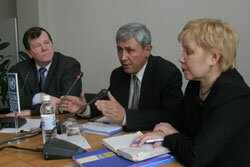 Mr. Jerzy Skuratowicz, UNDP Resident Representative and Mr. Mamasobir Burkhanov, Chief of the Osh Narcological Dispansery and Head of Methadone Maintenance programme met with journalists to present the UNDP Report “Reversing the Epidemic: Facts and Policy Options” launched in Moscow earlier this month. Mr. Jerzy Skuratowicz, UNDP Resident Representative and Mr. Mamasobir Burkhanov, Chief of the Osh Narcological Dispansery and Head of Methadone Maintenance programme met with journalists to present the UNDP Report “Reversing the Epidemic: Facts and Policy Options” launched in Moscow earlier this month.
The Report, prepared by UNDP in collaboration with the European Bureau of WHO, the World Bank and the Open Society Institute, offers the first comprehensive profile of the HIV/AIDS epidemic in the 28 countries of East and South Eastern Europe, the Baltics and the Commonwealth of Independent States (CIS), and provides a platform for the discussion of policy options to halt the spread of the disease.
In Kyrgyzstan, there is a comparatively low prevalence of HIV/AIDS (500 registered cases for 5 million population) in many respects due to the fact that the Kyrgyz Government with support of UNDP have been implementing activities to prevent spread of the infection in the country since 1997. At that time, not a single case of HIV was registered in Kyrgyzstan.
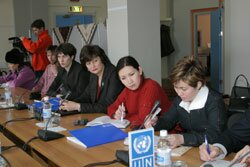 Now, Kyrgyzstan is a pilot country for innovative practices in fighting against the HIV/AIDS epidemic. Along with work on raising awareness of risk groups (commercial sex workers, men having sex with other men, drug abusers, prisoners, etc.), UNDP in cooperation with the Kyrgyz Government and other partners launched syringe exchange and methadone substitute therapy for drug abuse. The success of the latter, the methadone substitution programme led to the fact that Mr. Mamasobir Burkhanov, Chief of the Osh Narcological Dispansery and Head of Methadone Maintenance programme, was the only participant from Central Asia at the Launch of the UNDP AIDS Report in Moscow on 17th February. Now, Kyrgyzstan is a pilot country for innovative practices in fighting against the HIV/AIDS epidemic. Along with work on raising awareness of risk groups (commercial sex workers, men having sex with other men, drug abusers, prisoners, etc.), UNDP in cooperation with the Kyrgyz Government and other partners launched syringe exchange and methadone substitute therapy for drug abuse. The success of the latter, the methadone substitution programme led to the fact that Mr. Mamasobir Burkhanov, Chief of the Osh Narcological Dispansery and Head of Methadone Maintenance programme, was the only participant from Central Asia at the Launch of the UNDP AIDS Report in Moscow on 17th February.
For additional information, please contact Mia Rimby, UNDP Programme Officer. Tel: 0 (996 312) 61-12-13. Fax: 0 (996 312) 61-12-17. Email:
UNITED NATIONS CHILDREN’S FUND (UNICEF)
An issue of competence on HIV/AIDS among the UN staff in Kyrgyzstan was on agenda of the meeting of Heads of UN Agencies in Kyrgyzstan on 18 February 2004
What would you do if you get infected with HIV or if this happens to your colleague or your beloved family member? In Kyrgyzstan with estimated more than 5000 HIV-positive people, the threat of being infected has already stepped beyond risk-groups of drugs abusers or sex workers. Today, we are all at risk. To protect oneself means adopting appropriate attitudes and behaviours.
Often, this requires change which is not an easy thing since we are all influenced by centuries-long customs and stereotypes. Though the UN Agencies have been at the forefront of battling the epidemic for two decades, still global learning needs assessments show that only 51% of the UN staff self-reported to be ready to live and work with people who HIV-positive. Two thirds of respondents do not know where to turn for best possible treatment and counselling. Many people within the UN System still consider HIV be an issue of shame, remain shy of openly talking about it, and prefer to silence their inner fears and concerns.
An issue of competence on HIV/AIDS among the UN staff in Kyrgyzstan was on agenda of the meeting of Heads of UN Agencies in Kyrgyzstan on 18 February 2004. Jerzy Skuratowicz, the UN Resident Coordinator in KR, stressed that it is of primary importance to ensure that all the staff have basic knowledge to protect themselves, learn to speak about difficult issues and support a non-discriminating environment in the workplace. The UN staff ought to be models for changing attitudes towards HIV and infected people.
With this in mind, a learning plan is to be developed for the UN staff in Kyrgyzstan. It aims to empower the staff and their families, build a supportive and compassionate environment, and in the long run, to be one of UN contributions to overall national efforts towards achieving the UN’s Millennium Development Goal on reversing the spread of HIV/AIDS in the world.
“This experience might also serve as an example to follow for heads of the Government Agencies and non-governmental organizations in KR” added Richard Young, the Chair of the UN HIV/AIDS Theme Group. Throughout the world many companies make efforts to raise the competence of their staff on HIV/AIDS recognizing that the HIV/AIDS epidemic is a serious threat to productivity and profitability of their work. HIV is not only a social but also a development and business issue for all of us.
Contact: Richard Young, Resident Representative. Phone: (996 312) 61 12 24, 61 12 25; e-mail:
|

